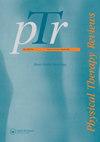Cognition-oriented treatments and physical exercise on cognitive function in Huntington’s disease: protocol for systematic review
IF 0.8
Q4 REHABILITATION
引用次数: 2
Abstract
Abstract Introduction Cognitive impairments are prevalent in Huntington’s disease (HD), occurring many years prior to clinical diagnosis and are the most impactful on quality of life. Cognitive interventions and exercise have been found to be efficacious in improving cognitive function in several clinical populations (e.g. older adults with mild cognitive impairment and dementia). However, the utility of cognitive interventions has not been systematically reviewed in HD. This systematic review aims to examine the efficacy of cognitive and physical interventions on cognitive function in HD. Methods Electronic databases (MEDLINE, EMBASE, PsycINFO, CENTRAL) were searched from inception until 10 May 2021 for interventional studies investigating the effect of cognition-oriented treatments and physical exercise on cognitive function in individuals with HD, compared to any control or no control. The primary outcome is change on objective measures of cognition. Additional outcomes include change in psychosocial, functional and neuroimaging measures. Variations of effects based on population and study factors will be considered. Risk of bias will be assessed using the Cochrane RoB 2 tool and ROBINS-I tool. Where appropriate, outcomes will be pooled using random-effects meta-analyses, heterogeneity will be examined using tau2 and I2 statistics, and moderators will be examined using meta-regression models. Discussion This review will systematically evaluate the efficacy of cognitive and physical interventions on improving cognitive function in HD. The eligibility criteria and planned analyses will allow for a comprehensive assessment of certainty in the evidence that will inform future trials and clinical practice. Registration This protocol was registered on PROSPERO (CRD42021259152).认知导向治疗和体育锻炼对亨廷顿舞蹈病认知功能的影响:系统评价方案
认知障碍在亨廷顿舞蹈病(HD)中普遍存在,在临床诊断前多年发生,并且对生活质量影响最大。认知干预和锻炼已被发现对改善一些临床人群的认知功能有效(例如,患有轻度认知障碍和痴呆的老年人)。然而,认知干预在HD中的应用尚未得到系统的回顾。本系统综述旨在探讨认知和身体干预对HD患者认知功能的影响。方法检索电子数据库(MEDLINE, EMBASE, PsycINFO, CENTRAL),从成立到2021年5月10日,调查认知导向治疗和体育锻炼对HD患者认知功能的影响的介入研究,与任何对照或无对照进行比较。主要结果是认知客观测量的改变。其他结果包括社会心理、功能和神经影像学指标的变化。将考虑基于人口和研究因素的影响变化。偏倚风险将使用Cochrane RoB 2工具和ROBINS-I工具进行评估。在适当的情况下,将使用随机效应荟萃分析汇总结果,使用tau2和I2统计量检查异质性,并使用元回归模型检查调节因子。本文将系统评价认知和身体干预对改善HD患者认知功能的效果。资格标准和计划分析将允许对证据的确定性进行全面评估,这将为未来的试验和临床实践提供信息。注册协议在PROSPERO上注册(CRD42021259152)。
本文章由计算机程序翻译,如有差异,请以英文原文为准。
求助全文
约1分钟内获得全文
求助全文
来源期刊

Physical Therapy Reviews
REHABILITATION-
CiteScore
1.30
自引率
0.00%
发文量
26
期刊介绍:
Physical Therapy Reviews is an international journal which aims to publish contemporary reviews, discussion papers and editorials within physical therapy, and in those basic and clinical sciences which are the basis of physical therapy. The journal is aimed at all those involved in research, teaching and practice within the area of physical therapy. Reviews (both descriptive and systematic) are invited in the following areas, which reflect the breadth and diversity of practice within physical therapy: •neurological rehabilitation •movement and exercise •orthopaedics and rheumatology •manual therapy and massage •sports medicine •measurement •chest physiotherapy •electrotherapeutics •obstetrics and gynaecology •complementary therapies •professional issues •musculoskeletal rehabilitation
 求助内容:
求助内容: 应助结果提醒方式:
应助结果提醒方式:


